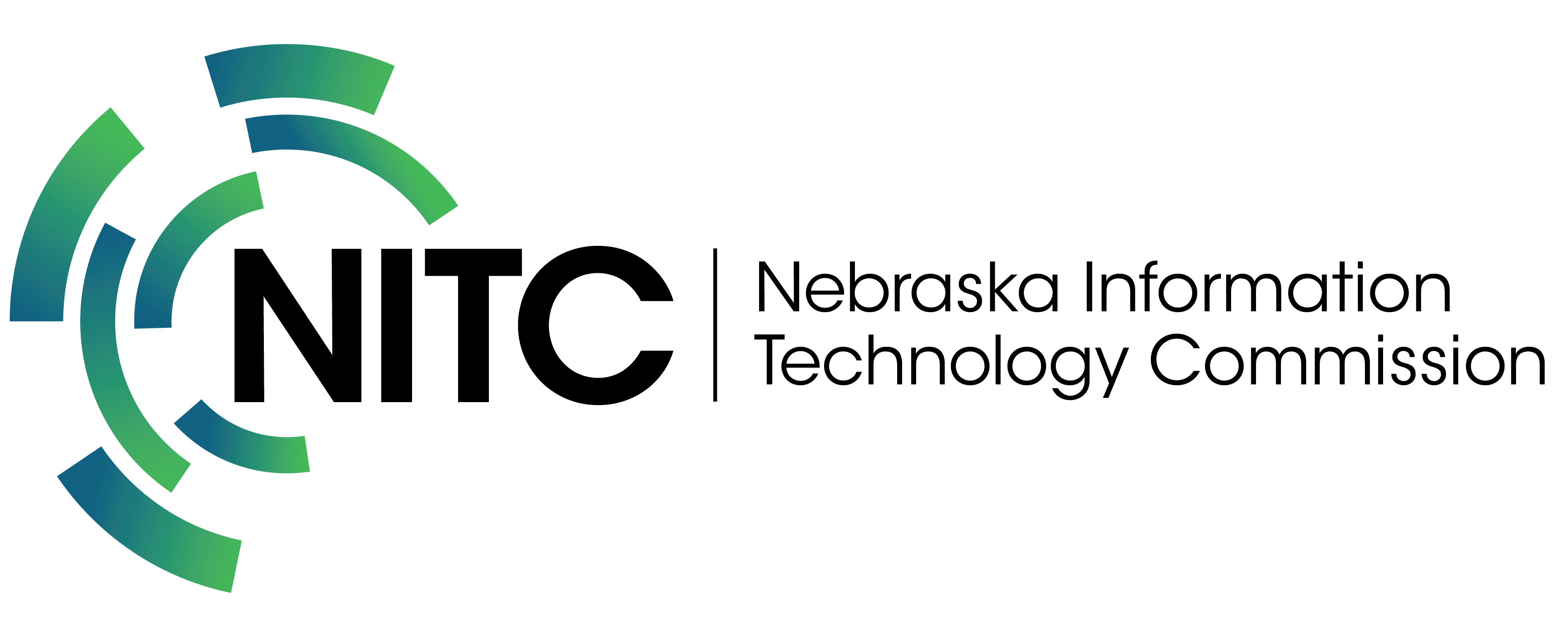NEBRASKA INFORMATION TECHNOLOGY COMMISSION
Wednesday, April 14, 1999, 1:30 p.m.
Teleconference Sites:
Omaha: State Office Building, Room 134, 1313 Farnam
Lincoln: Executive Building, Room 103 Video Conference Room, 521 S 14th Street
Kearney: Public Library, Media Room-2nd Floor, 2020 1st Avenue
APPROVED MEETING MINUTES
Members Present |
| Omaha Site: Lt. Governor Dave Maurstad, Chair; Doug Christensen, Commissioner, State Department of Education; L. Merill Bryan, Senior Vice President, Union Pacific; L. Dennis Smith, President, University of Nebraska; Hod Kosman, Chair & President, Platte Valley Financial Services, Peter Castellano (non-voting representative for Senator Kerrey) |
| Lincoln Site:Greg Adams, Mayor, City of York; Gary Kuck, President and CEO, Centurion International |
| Kearney Site: Eric Brown, General Manager, Station KRVN |
CALL TO ORDER AND APPROVAL OF FEBRUARY MINUTES:
Lt. Governor Maurstad called the meeting to order at 1:35 p.m. Roll call was taken. A quorum existed with eight Commissioners present. Commissioner Smith moved and it was seconded by Commissioner Bryan to approve the November minutes. Vote: Adams-Yes, Brown-Yes, Bryan-Yes, Kuck-Yes, Maurstad-Yes, and Smith-Yes. Commissioners Christensen and Kosman were not present at time of voting. Motion to approve the minutes as presented was carried.
PUBLIC COMMENT: There were no public comments.
STAFF REPORT - Staff Report: Policies & Procedures for Preparing the Statewide Technology Plan:
Overview and Progress Report & Section 1: Strategic Goals and Objectives - Michael Winkle
Mr. Winkle reported that meetings have been held with staff from the legislative, administrative and fiscal offices for input on the goals and objectives for the statewide plan. Commissioners will further develop these goals later on in the meeting.
Section 2: Value Criteria - Steve Schafer
A draft "Value Criteria -- NITC" document was distributed to commissioners for their information. Mr. Schafer provided an overview of the process and explained that the value criteria should be neutral in terms of distinguishing between projects serving different functional or programmatic purposes. Four steps would be involved in the process: Step 1-Establishing Value Criteria, Step 2-Assign Relative Weights to Value Criteria, Step 3-Scoring System, and Step 4-Project Evaluation and Priority Ranking. This process will also be shared with the councils and the joint planning subcommittee for their input and feedback.
Commissioners Input/Questions: Concerns were expressed that a numeric rating systems would leave little opportunity for subjectivity. It was suggested to give consideration for a "+ or -" rating. It was also recommended to include a statement in reference to the project "conforming to the statewide plan" possibly in Step 4 of the process.
Mr. Winkle acknowledged that this process is an attempt to build a consensus instrument to utilize in recommending funding of projects. During the last funding process, it was stated by the councils that an instrument like this was needed.
Section 2: Sector Priorities and Action Plans - Tom Rolfes
The "Sector Priorities and Action Plans Process" document was distributed to commissioners. Mr. Rolfes provided an overview and explained that the Joint Planning Subcommittee will be meeting sometime after the NITC April 14th meeting to begin work on Step 1, Needs Assessment Task A - to conduct a perceived needs assessment. This would be a cross sectional perspective of the most important problems and opportunities that require the use of information technology. Step 1, Tasks B and C, will be done by the councils at the May meeting. The input cross section perspective will be brought back to each of the councils for input, suggestions and prioritization. The June meeting will be spent on Step 2 Casual Analysis, Tasks A, B and C - to describe present conditions, desired outcomes and causes of identified needs. The Joint Planning Subcommittee will then meet again to consolidate the input from the councils. Mr. Winkle commented that this phase of work is at a high level at first and would eventually be more specific and fine-tuned.
Section 3: Technical Infrastructure - Michael Winkle
Mr. Winkle reported that the Technical Panel will utilize the same process as the councils and joint planning subcommittee to develop a strategic plan for technical infrastructure.
Section 4: Process and Procedures - Steve Schafer
Staff will work on this part of the plan later this summer.
NITC MISSION STATEMENT REVIEW:
After discussion of rearranging some of the words within the statement, Commissioner Christensen moved and it was seconded by Commissioner Brown to change the wording of the mission statement to read as follows: "The mission of the Nebraska Information Technology Commission is to make the State of Nebraska's information technology infrastructure more accessible and responsive to the needs of its citizens regardless of location while making investments in government, education, health care and other services more efficient and cost effective." All were in favor. Motion carried.
NITC VISION STATEMENT REVIEW:
After discussion of omitting and rearranging some of the words within the statement, Commissioner Brown moved and it was seconded by Commissioner Smith to change the wording of the vision statement to read as follows: " Promote the use of information technology in education, health care, economic development, and all levels of government services to improve the quality of life of all Nebraskans." All were is favor. Motion carried.
STRATEGIC GOALS & OBJECTIVES: DISCUSSION AND PRIORITIZATION - Lt. Governor Maurstad
Staff had drafted a document listing the goals and duties of the NITC per LB924. Discussion followed and goals and sub-goals were assigned. Commissioner Smith moved and it was seconded by Commissioner Christensen to accept the draft goals and objectives (listed below) and to post them on the web's discussion group for commissioners to provide further input by May 14th so that action can be taken at the June meeting. All were in favor. Motion carried.
- Support the development of a unified statewide telecommunications infrastructure that is accessible, scalable, reliable and efficient.
- Improve government efficiency
- Broaden educational opportunities
- Enhance services to Nebraska communities and citizens
- Expand access to life long educational and training opportunities so that Nebraska's citizens and work force can function in the emerging information society
- Expand citizen access to government information
- Coordinate the state's investment in an efficient and expeditious manner, and not to impede the rapid deployment of appropriate technology or establish cumbersome regulations or bureaucracy.
- Organize technology planning in new ways to aggregate demand, reduce costs, and create support networks; encourage collaboration between communities of interest; and encourage competition among technology and service providers
- Determine broad strategy and objectives for developing and sustaining information technology development in Nebraska, including long-range funding strategies.
- Stimulate and support information-based economic development that improves economic opportunity
- Use information technology in education, communities, including health care and economic development, and every level of government service to improve economic opportunities
- Stimulate the demand to encourage and enable long-term infrastructure innovation and improvement
NEW BUSINESS:
There was no new business.
NEXT MEETING DATE:
Staff will check on Commissioner's availability for a late June meeting. Lt. Governor Maurstad adjourned the meeting at 4:00 p.m.
Minutes taken by Lori Lopez Urdiales, Administrative Assistant, and reviewed by staff of the Office of the Chief Information Officer/NITC.
Meeting Minutes
